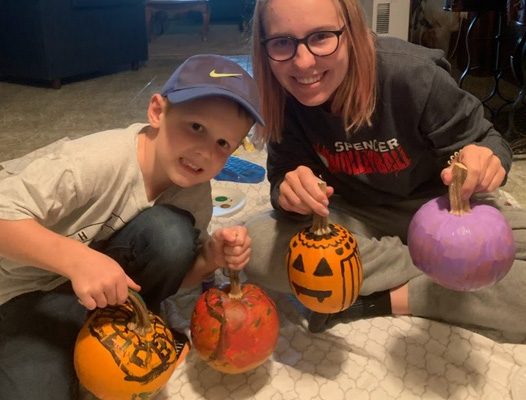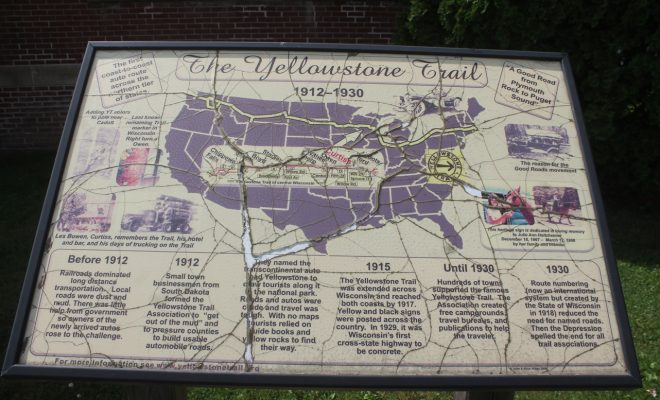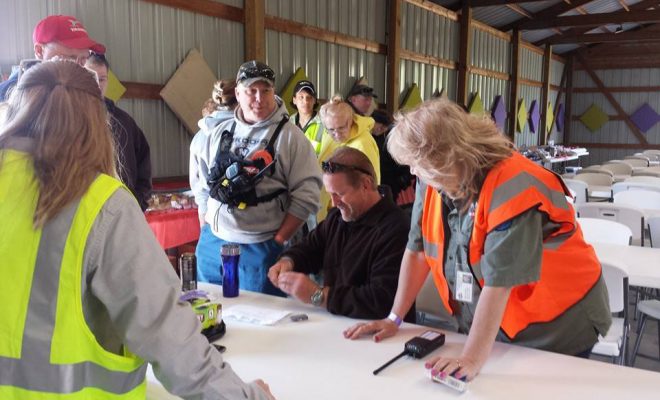The Greatest Gift

The benefits of volunteering
By Kris Leonhardt
CENTRAL WISCONSIN – The recent environment has led us on a path of social distancing and isolation. For the elderly, unemployed, and families balancing their children’s education and working from home, the cancellation of social events and limited face-to-face contact brought about a need for human interaction which many filled with volunteerism.
Data from LinkedIn’s Economic Graph in August 2020 reflected over 110,000 volunteer services being added through its U.S. members – 2.5 times more than the same month in 2017.
While the events of spring 2020, put services on hold, Marshfield Clinic Health System Volunteer Services Manager Keresa Kilty said the want and need for volunteering never truly waivered.
“During COVID initially, we did put a lot of our service areas on pause. Obviously, volunteers are a vital part of our team; we place a high priority on their health and safety, so when the Stay at Home Order was announced, we said ‘We are pausing the service.’
“But then what our awesome volunteers did; they made 60,000 cloth masks; because, these individuals still want to give back.”
But work didn’t end there.
“What it did is it got us creative,” Kilty added.
“Working individuals who were furloughed said, ‘Oh no, I want to give back. I want to do something.”
As the need for their Home Delivered Meals increased, volunteers came in to help with routes. Volunteers also safely assembled 100,000 COVID test kits and activity bags, until they were eased back into their previous volunteer positions.
This not only filled a need for human interaction, researchers say it provided some additional health benefits.
The Benefits
According to a study by the Corporation for National and Community Service, volunteers help themselves to better health through community service.
“A Review of Recent Research has found a significant connection between volunteering and good health. The report shows that volunteers have greater longevity, higher functional ability, lower rates of depression and less incidence of heart disease,” the organization stated in a report.
“Research suggests that volunteering is particularly beneficial to the health of older adults and those serving 100 hours annually.
“A study of adults age 65 and older found that the positive effect of volunteering on physical and mental health is due to the personal sense of accomplishment an individual gains from his or her volunteer activities.
“Another study found that volunteering led to lower rates of depression in individuals 65 and older.
An analysis of longitudinal data also found that “individuals over 70 who volunteered approximately 100 hours had less of a decline in self-reported health and functioning levels, experienced lower levels of depression, and had more longevity.”
“People can feel more connected to their community, feel that they are making a difference, boost their self-esteem and improve their mental health by getting involved with an agency or organization that they are passionate about,” said Amy Fluno, United Way of South Wood & Adams Counties Volunteer Center.
“Being a Big Brother or Big Sister is one of the most enjoyable things you’ll ever do. Not to mention, one of the most fulfilling. Volunteers have the opportunity to help shape a child’s future for the better by inspiring positive change and empowering them to achieve what they never dreamed possible. And the best part is, it’s actually a lot of fun,” added Big Brothers Big Sisters of Central Wisconsin Executive Director Dawn Cherek.
Marshfield Clinic Health System has 450 volunteers among various demographics in 40 different roles. Kilty said that the benefits she sees are “personal satisfaction and growth, it’s exploring potential careers in healthcare, (and) making a difference. A lot of our volunteers, they just want to meet new people, so it is very social for them. Personal satisfaction from just helping others and knowing that you’ve done that; giving back to the community; staying active, social, and healthy; that is huge for a lot of our volunteers. And, I feel like it really enriches their lives, as well as the life of others. I think that some of them want to take on a new challenge; they want to push themselves to do something different, something new.”
A remaining need
While community service work has seen some growth, volunteer coordinators are quick to point out that the need is still there.
“Many organizations had to do without in person volunteers. Some got creative and made volunteer opportunities that people could do from home and still can. Others are slowly bringing their volunteers back in face to face,” Fluno said.
“Volunteers are needed no more than ever. We encourage members of the community to connect with us at United Way and the Volunteer Center so we can help you find a meaningful opportunity that fits your interests.”
“Currently there are over 25 youth (ages 6-17) waiting to be matched with a Big Brother or Big Sisters. We are currently looking for volunteers for our community-based program,” Cherek explained.
“This fall, we are hopeful to resume our Site-Based mentoring program and will be looking for additional volunteers. In Site-Based mentoring, Bigs and Littles meet weekly at a consistent time and place throughout the school year, typically during the child’s lunch time. At the match site, which is typically the Little’s school, they spend time together doing activities such as playing games, working on crafts, doing shared projects or homework — anything they can do together at their site.”
Kilty adds that the need for volunteers is always there and is an important part of the services they provide, which produces major benefits to those being served.
“As a regional center, we have a lot of people that are not familiar with the facility. They are maybe coming from Upper Michigan, or wherever, for the first time ever; they are coming here and seeking care. Let’s just take a surgical patient, if they are coming here there is a lot of anxiety; they are coming here for the first time and having a procedure, so there is a lot of anxiety.
“A lot of our volunteers, at our main info desk or up in our surgical waiting room, it’s that face; it’s the warm smile; it’s the friendly, helpful personality that I feel really comforts and eases the anxiety that these patients and their family members may be feeling.
“(With) Home Delivered Meals, when you talk about the receiving end, if it wasn’t for the volunteers; they are the ones literally delivering daily meals to recipients. (It’s a) huge service.
“That may be their only visit for the day. Home Delivered Meals is truly like a wellness check and also a social. It’s making sure they are okay, but also delivering them that hot meal. So, from a nutrition standpoint, but also that conversation and that interaction, which is so important.”







